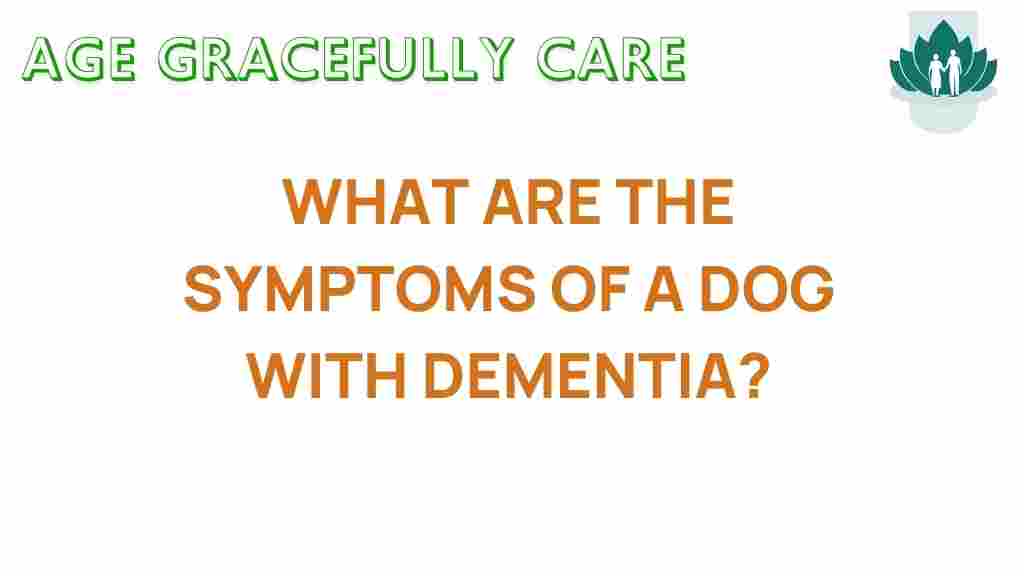Unraveling Canine Cognition: What Are the Symptoms of Dog Dementia?
As our furry companions age, they may face various health challenges, one of which is dog dementia. This condition, formally known as Canine Cognitive Dysfunction (CCD), affects canine cognition and can significantly alter a dog’s behavior and memory. Understanding the symptoms of dog dementia is crucial for pet owners, especially for those caring for elderly dogs. This article will delve into the symptoms, potential causes, and helpful tips for managing pet health in dogs with dementia.
Understanding Dog Dementia
Dog dementia is akin to Alzheimer’s disease in humans. It is a degenerative brain condition that affects a dog’s cognitive functions, leading to noticeable behavioral changes. As dogs age, their brains undergo physical changes that can manifest as memory loss, confusion, and altered responses to everyday situations.
Common Symptoms of Dog Dementia
Recognizing the symptoms of dog dementia early on can help you seek veterinary advice and improve your dog’s quality of life. Here are some of the most common signs to watch for:
- Memory Loss: Dogs may forget familiar commands, faces, or places. They might wander around the house or get lost in familiar environments.
- Behavior Changes: Changes in behavior are often the first indicators of dog dementia. This can include increased anxiety, irritability, or changes in sleeping patterns.
- Disorientation: Dogs may seem confused or disoriented, even in familiar surroundings. They might stare blankly at walls or objects.
- Altered Interactions: An elderly dog struggling with dementia may become less interested in social interactions, including play or attention from their owners.
- Loss of House Training: In some cases, dogs may forget their house training and start having accidents indoors.
- Increased Vocalization: Affected dogs may bark or howl more frequently, often without apparent reason.
- Changes in Eating and Drinking Habits: Your dog may become less interested in food or water, or they may eat or drink excessively.
Diagnosing Dog Dementia
If you suspect your dog is exhibiting symptoms of dementia, it’s crucial to consult your veterinarian. They will perform a thorough examination to rule out other potential health issues that could be causing the symptoms. The diagnostic process may include:
- Physical Examination: A complete physical check-up to assess your dog’s overall health.
- Blood Tests: Blood work can help identify underlying conditions that might mimic dementia symptoms.
- Behavioral Assessment: Your vet may ask about your dog’s behavior changes and any specific symptoms you’ve noticed.
Coping with Dog Dementia: A Step-by-Step Process
While dog dementia is a challenging condition, there are several strategies you can implement to help your dog cope:
1. Establish a Routine
Dogs thrive on routine. Keeping a consistent schedule for feeding, walks, and playtime can provide a sense of security and reduce anxiety.
2. Create a Safe Environment
Make your home safe and comfortable for your dog. Remove obstacles they might trip over and provide a quiet space for them to rest without disturbances.
3. Mental Stimulation
Engage your dog’s mind with puzzle toys, scent games, and gentle training exercises. This can help slow cognitive decline and keep them mentally active.
4. Dietary Considerations
Consult your veterinarian about dietary changes that may support brain health. Some diets are formulated with ingredients like omega-3 fatty acids, antioxidants, and specific vitamins that can benefit cognitive function.
5. Regular Veterinary Check-Ups
Keep up with regular veterinary visits to monitor your dog’s health and adjust care plans as needed. Your vet can provide tailored advice for managing dog dementia.
6. Medication and Supplements
In some cases, your vet may recommend medications or supplements to help manage symptoms of dog dementia. Always discuss these options with your veterinarian.
Troubleshooting Tips for Managing Symptoms
If your dog exhibits symptoms of dementia, here are some troubleshooting tips to help manage their condition:
- Keep Things Familiar: Avoid making drastic changes to your dog’s environment. Keep their bedding, toys, and food in the same place to reduce confusion.
- Use Positive Reinforcement: Encourage desired behaviors with treats and praise, helping reinforce positive interactions.
- Limit Stressors: Identify and minimize potential stressors in your dog’s environment, such as loud noises or a chaotic household.
- Stay Patient: Your dog may not respond to commands or behaviors like they used to. Patience and understanding will help you both navigate this challenging time.
- Consider Professional Help: If your dog’s anxiety or behavior changes are severe, consider consulting a professional dog trainer or a veterinary behaviorist.
Promoting Mental Health in Elderly Dogs
Ensuring the mental health of elderly dogs is vital for their overall well-being. Here are some additional tips:
- Socialization: Encourage interactions with other dogs and people to keep your dog socially engaged.
- Physical Exercise: Regular, gentle exercise helps maintain physical health and can alleviate some symptoms of cognitive decline.
- Interactive Play: Spend quality time playing games that stimulate your dog mentally, such as hide and seek or fetch.
- Quality Time: Simply spending time with your dog can provide comfort and reassurance.
Conclusion
Understanding dog dementia and recognizing the symptoms can significantly impact your dog’s quality of life. By being proactive in managing their health and behavior, you can provide the support your elderly dog needs to thrive despite cognitive challenges. Always consult with your veterinarian for tailored advice and treatment options to enhance your dog’s pet health. Remember, you’re not alone in this journey; many resources are available to help you and your furry friend navigate the complexities of canine cognition.
For more information on pet health and care, you can visit this resource. And for more details on canine cognition, check out this link.
This article is in the category Health and created by AgeGracefullyCare Team
